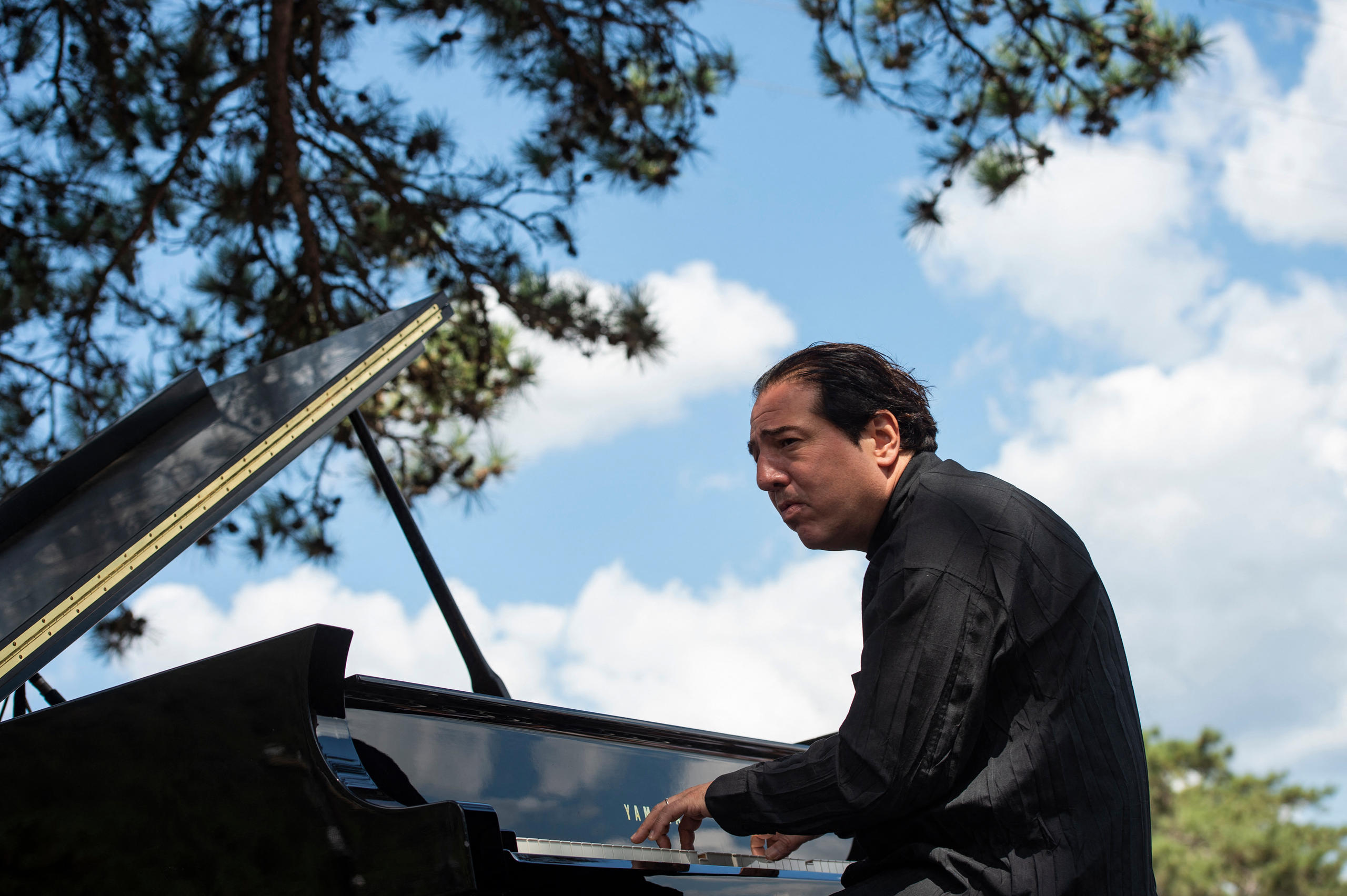
Does the Swiss cultural scene need more debate?

Swiss retailer Migros recently cancelled four performances in Switzerland by the world-famous Turkish classical pianist Fazil Say after he posted a tweet critical of Israel. Was this reaction appropriate?
Fazil Say’s piano playing is often intense and always surprising. The same could be said of his recent statements on the platform X, formerly known as Twitter, about the current situation in the Middle East.
In his tweet published on X, Fazil Say shared a post by Turkish President Recep Tayyip Erdogan in which he attributed the fatal rocket strike on the Al Ahli Hospital in the Gaza Strip on Tuesday to Israel. Say thanked Erdogen for his sensible explanation and called for Israeli Prime Minister Benjamin Netanyahu to be brought to justice. He also said that all people must do something to stop this war.
Migros reacted by excluding Say from a series of planned classical concerts in Switzerland because his “public statements following the terrorist attack on Israel, which are not defensible for Migros”.
Gaza’s health ministry blamed an Israeli air strike for the blast at the hospital, while Israel said it was caused by a failed rocket launch by militants. Britain, the United States, France and Canada have all concluded that the explosion at the hospital in Gaza City was most likely caused by a missile fired from within Gaza, and not by a rocket from Israel.
While the Turkish president later wrote a second X post in which he no longer blamed Israel, Say continues to stand by his statements.
The cancellation of the Migros concerts raises many questions, including about the level of debate in the cultural sector on the geopolitical situation in the Middle East and events elsewhere in the world.
The cancellation of Say’s concerts mirrors similar incidents. For example, a planned panel discussion in Bern on Gender and the Politics of Fear with the American philosopher Judith Butler on October 26 was cancelled. She had recently published an essay in the London Review of BooksExternal link on the Middle East conflict entitled “The Compass of Mourning”.
The American philosopher and gender researcher Judith Butler, who is Jewish, is one of the most prominent representatives of the global left. She is a member of the Boycott, Divestment, Sanctions (BDS) movement that works to end international support for Israel’s oppression of Palestinians and pressure Israel to comply with international law.
Butler recently signed an open letter in which cultural figures and intellectuals demand “justice for the Palestinians in Gaza.” She recently wrote an essay on the Middle East conflict in the London Review of Books in which she condemns the attack on Israel by the terrorist organisation Hamas, but also criticises Israel’s Palestinian policy.
On October 26, she was due to give a lecture at the “Gender and the Politics of Fear” symposium at the Dampfzentrale Bern. The event was cancelled by the University of Bern.
It stated: “The event was cancelled due to unforeseen circumstances and personal reasons. We do not know whether these reasons are related to the war in the Middle East.”
The director of Basel’s Culturescapes festivalExternal link, Jurriaan Cooiman, works mainly with artists from the Global South. He is highly critical of the lack of political debate in the cultural sector. “We should be able to endure the debate. Concert experiences perhaps become deeper and more moving when you understand that culture does not take place in a vacuum, but always has a political dimension,” he said.
Fazil Say responded to the Swiss concert cancellations with a statementExternal link on Facebook and X: “I am for peace, and all my statements were in the spirit of peace. And I have always been in favour of the good, of compromise, and of jointly seeking a beautiful future.”
pic.twitter.com/wqHf48OtqxExternal link
— Fazıl Say (@fazilsaymusic) October 20, 2023External link

It was not the first time the Turkish pianist, who grew up in a secular environment in the capital Ankara, has drawn attention to himself via critical statements. He has repeatedly criticised the Turkish government and Islam. His relationship with Turkish President Recep Tayyip Erdogan is considered complicated. In 2013, Say was accused of retweeting Persian verses by the poet Omar KhayyamExternal link, which were viewed as being critical of Islam, and was handed a ten-month suspended prison sentence.
Say’s artistic identity is diverse. He studied in Berlin and gives concerts in New York and Tokyo. He draws his inspiration from Turkish folk music. He’s hard to pin down politically. His controversial statement on the Israeli-Palestinian war received much support from Muslim countries, and the West reacted with outrage.
Jurriaan Cooiman insists on the distinction between cultural institutions and artists. “I believe that art and artists live by saying things that have affected them,” says the festival director. “Cultural institutions, on the other hand, are concerned with surviving in our society. They depend on the political climate, the mood, and the financial situation.”
He would like to see more room for moderated debate in the Swiss cultural scene. But above all he believes we need more courage to say “this is our point of view, and we will see it through”.

In compliance with the JTI standards
More: SWI swissinfo.ch certified by the Journalism Trust Initiative

























You can find an overview of ongoing debates with our journalists here . Please join us!
If you want to start a conversation about a topic raised in this article or want to report factual errors, email us at english@swissinfo.ch.